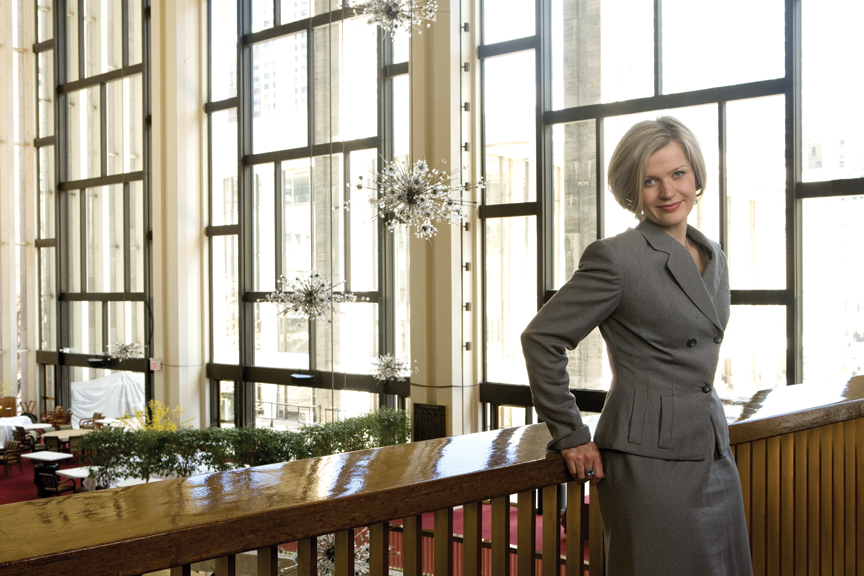Debut long overdue
We meet with Erika Sunnegårdh, who, as an untested understudy, was prematurely thrust into her Metropolitan Opera debut on April 1, 2006. Substituting for Finnish Karita Mattila, who was sick, as Leonore in Beethoven’s “Fidelio.”
-
 “I don’t believe in always staying in one’s own comfort zone. I believe I have the responsibility to give all of myself, to go beyond …” - Erika Sunnegårdh, photographed at the Metropolitan Opera by Henrik Olund.
“I don’t believe in always staying in one’s own comfort zone. I believe I have the responsibility to give all of myself, to go beyond …” - Erika Sunnegårdh, photographed at the Metropolitan Opera by Henrik Olund. -
-
Favorite part: “Leonore, she has such a positive outlook on life.”
Listens to: “Everything!”
Reads: “Right now Zadie Smith’s ‘White teeth’. One book that has really helped me is ‘The Power of Now’ by Eckhart Tolle. It’s about living in the moment, which I feel is the difference between a good artist and a great artist: A great artist is present in the here and now, without judgment, daring to let go of fear.”
Enjoys: “Argentinian tango. I’m really hooked! I also run and do yoga.” -
Six contracts with the New York’s Metropolitan Opera have catapulted Swedish soprano Erika Sunnegårdh right into the limelight from relative obscurity. But has years of waiting tables, working as a tour guide and cantor dampened opera dreams on a bigger scale?
When I meet with Sunnegårdh at New York’s Café La Fortuna, her debut on the Met as Lenore in “Fidelio” is around the corner. But she doesn’t seem frazzled or nervous, rather levelheaded and happy, and not the least bit smug over her sudden success. -
“I didn’t want to go out and audition until I was absolutely ready,” she says. “And it took me a long time to get my voice together technically. I sang art songs, chamber music…just not opera.”
Nobody, however, can make a living on singing art songs. So Sunnegårdh did a number of odd jobs on the side. As an opera singer waiting tables, she must have looked like the answer to “What’s wrong with this picture?” but Sunnegårdh doesn’t see it that way. -
“You must accept life for what it is. There are no guarantees. I think it’s worthwhile to dedicate yourself to something you love no matter what. When you’re my age and it hasn’t happened, then perhaps it never will – you sort of make peace with that.”
Luckily it did happen for Sunnegårdh. When she felt ready, she contacted an agent who helped her get some engagements in Sweden, so she sang “Turandot” at Malmö Opera och Musikteater and Norrlandsoperan to great reviews. -
“It was a lot of fun, and it was all positive - people were very nice. I was very well received in Sweden,” she says.
She also performed Beethoven’s “Ninth Symphony” with the Gothenburg Symphony Orchestra and sang her first Elsa in concerts of “Lohengrin” in Spain.
When she auditioned for the Met she was, she claims, “totally relaxed”.
“It was sink or swim,” she says, adding it felt like a good audition. After a callback a few days later, she sang on the Met’s big stage for, among others, the artistic director James Levine. Everyone present wondered why on Earth they had never heard Sunnegårdh before, to which she responded in kind that she’d never sung before!
“I’m glad it happened to me now,” says Sunnegårdh. “I think when you’re very young and something like this happens, you might not be ready. You might not understand that people are stepping on you, and that sometimes you have to speak up or even sever ties. A friend of mine and I were talking, and the word courage came up. That word comes from the French word cœur, which means heart. It also implies that you feel fear, but that you go ahead anyway. And that’s how I believe one should do things in life, despite the fear and with great heart.” -
Written by Eva Stenskär
-
-
